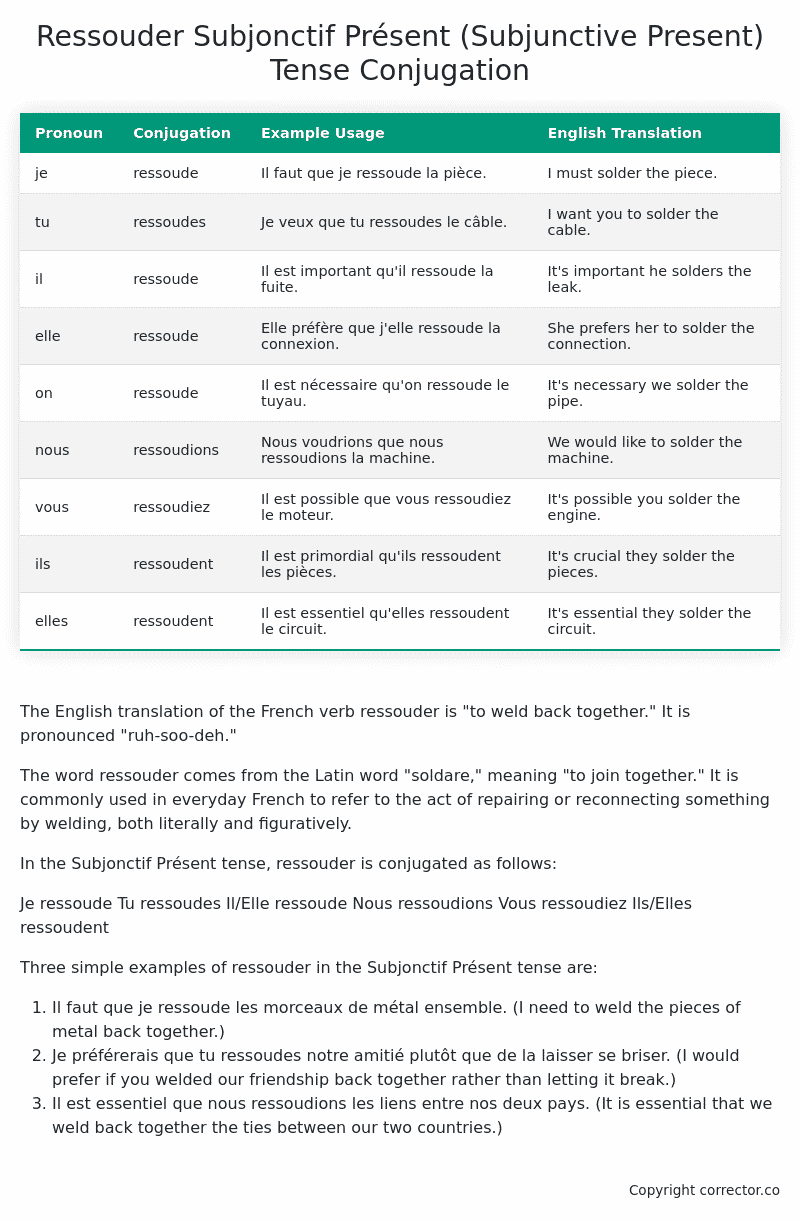Subjonctif Présent (Subjunctive Present) Tense Conjugation of the French Verb ressouder
Introduction to the verb ressouder
The English translation of the French verb ressouder is “to weld back together.” It is pronounced “ruh-soo-deh.”
The word ressouder comes from the Latin word “soldare,” meaning “to join together.” It is commonly used in everyday French to refer to the act of repairing or reconnecting something by welding, both literally and figuratively.
In the Subjonctif Présent tense, ressouder is conjugated as follows:
Je ressoude
Tu ressoudes
Il/Elle ressoude
Nous ressoudions
Vous ressoudiez
Ils/Elles ressoudent
Three simple examples of ressouder in the Subjonctif Présent tense are:
- Il faut que je ressoude les morceaux de métal ensemble. (I need to weld the pieces of metal back together.)
- Je préférerais que tu ressoudes notre amitié plutôt que de la laisser se briser. (I would prefer if you welded our friendship back together rather than letting it break.)
- Il est essentiel que nous ressoudions les liens entre nos deux pays. (It is essential that we weld back together the ties between our two countries.)
Table of the Subjonctif Présent (Subjunctive Present) Tense Conjugation of ressouder
| Pronoun | Conjugation | Example Usage | English Translation |
|---|---|---|---|
| je | ressoude | Il faut que je ressoude la pièce. | I must solder the piece. |
| tu | ressoudes | Je veux que tu ressoudes le câble. | I want you to solder the cable. |
| il | ressoude | Il est important qu’il ressoude la fuite. | It’s important he solders the leak. |
| elle | ressoude | Elle préfère que j’elle ressoude la connexion. | She prefers her to solder the connection. |
| on | ressoude | Il est nécessaire qu’on ressoude le tuyau. | It’s necessary we solder the pipe. |
| nous | ressoudions | Nous voudrions que nous ressoudions la machine. | We would like to solder the machine. |
| vous | ressoudiez | Il est possible que vous ressoudiez le moteur. | It’s possible you solder the engine. |
| ils | ressoudent | Il est primordial qu’ils ressoudent les pièces. | It’s crucial they solder the pieces. |
| elles | ressoudent | Il est essentiel qu’elles ressoudent le circuit. | It’s essential they solder the circuit. |
Other Conjugations for Ressouder.
Le Present (Present Tense) Conjugation of the French Verb ressouder
Imparfait (Imperfect) Tense Conjugation of the French Verb ressouder
Passé Simple (Simple Past) Tense Conjugation of the French Verb ressouder
Passé Composé (Present Perfect) Tense Conjugation of the French Verb ressouder
Futur Simple (Simple Future) Tense Conjugation of the French Verb ressouder
Futur Proche (Near Future) Tense Conjugation of the French Verb ressouder
Plus-que-parfait (Pluperfect) Tense Conjugation of the French Verb ressouder
Passé Antérieur (Past Anterior) Tense Conjugation of the French Verb ressouder
Futur Antérieur (Future Anterior) Tense Conjugation of the French Verb ressouder
Subjonctif Présent (Subjunctive Present) Tense Conjugation of the French Verb ressouder (this article)
Subjonctif Passé (Subjunctive Past) Tense Conjugation of the French Verb ressouder
Subjonctif Imparfait (Subjunctive Imperfect) Tense Conjugation of the French Verb ressouder
Subjonctif Plus-que-parfait (Subjunctive Pluperfect) Tense Conjugation of the French Verb ressouder
Conditionnel Présent (Conditional Present) Tense Conjugation of the French Verb ressouder
Conditionnel Passé (Conditional Past) Tense Conjugation of the French Verb ressouder
L’impératif Présent (Imperative Present) Tense Conjugation of the French Verb ressouder
L’infinitif Présent (Infinitive Present) Tense Conjugation of the French Verb ressouder
Struggling with French verbs or the language in general? Why not use our free French Grammar Checker – no registration required!
Get a FREE Download Study Sheet of this Conjugation 🔥
Simply right click the image below, click “save image” and get your free reference for the ressouder Subjonctif Présent tense conjugation!

Ressouder – About the French Subjonctif Présent (Subjunctive Present) Tense
Formation of the Subjonctif Présent
Common Everyday Usage Patterns
Interactions with Other Tenses
Summary
I hope you enjoyed this article on the verb ressouder. Still in a learning mood? Check out another TOTALLY random French verb conjugation!


